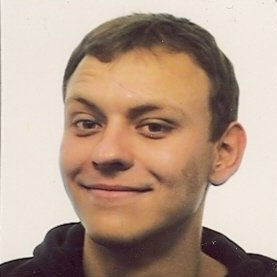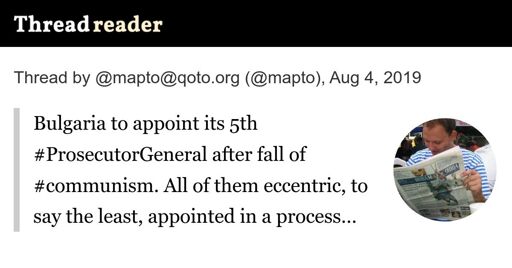From an old twitter thread (August 2019):
Bulgaria to appoint its 5th #ProsecutorGeneral after fall of #communism. All of them eccentric, to say the least, appointed in a process that illustrates what in South European languages is known as #BulgarianVote #MaggioranzaBulgara #VotarALaBulgara (thread)
1st, Ivan Tatarchev appointed 1992, publicly bragged: “Only God is above me”, due to institution shaped after Soviet Vishinsky model, guaranteed by Constitution art.126(2) “Prosecutor General shall oversee the legality and provide methodological guidance to all other prosecutors”
2nd, Nikola Filchev was the ruthless. Among hanging accusations that he guaranteed for the smuggling of weapons and deaths of #whistleblower prosecutors, he was the cause of court ruling in the ECHR against Bulgaria.
Boris Veltchev, grandson of communist party figurehead with same name, was the youngest and most fairish. He wrote of “knowing the ease of convicting someone” further explaining how business can cleanse competition with the help of prosecutors and let charges fail whenever wanted
The 4th and currently outgoing prosecutor general, Sotir Tsatsarov, gained his own fame when a media mogul accused him of being summoned and threatened personally by Tsatsarov in the presence of a heavyweight politically-affiliated mediator-businessman
Now we are in the middle of a new appointment process. Only one nomination, unanimous, unmotivated. Letters of support are flying in from institutions all over the country, often to surprise of people in them. Might be strange to those not familiar with Maggioranza bulgara
There’s nothing strange. The well-known candidate - Ivan Geshev - is currently deputy prosecutor general and chief of recently founded specialised prosecution office. It is, unclear how the last one coexists with art.119(3) of the Constitution of Bulgaria saying “There shall be no extraordinary courts”. According to legal experts, the specialised court - where the cases raised by the specialised prosecution are seen - is unconstitutional. As per art.126(1) of the Constitution, the prosecution of Bulgaria is organised following the organisation of the courts. As a consequence, the existence of the specialised prosecution is viewed as a direct consequence of an unconstitutional construct.
Geshev was in charge of the team investigating the failure of Bulgaria’s 4th largest bank. When asked why despite leaked documents of dubious lending to the politically-backed oligarch Peevski, his name was absent from the indictment, response was “so are the names of Obama and Putin”
Another flagship case - corruption allegations against the only independent elected politician in the country, the mayor of a district in Sofia, Desislava Ivancheva and her deputy. Geshev: bold claims and accusations before hearings, disproportional treatment to of the accused
But evidence seems to have evaporated in court, witnesses did not confirm statements in court. Geshev’s reaction? Racist comments about key witness: “all gypsies do that”
Explaining on national TV his vision of the prosecution’s governance, Geshev said he finds separation of power in the government unnecessary. He even went as far as mentioning specific opposition figures who he intends to target once he enters in power
This in the country that is poorest, most corrupt and least free in the EU according to international rankings. Since the fall of communism in 1989, mass protests led to early elections in Bulgaria in 1991, 1997, 2009 and 2013
Since 2021 Bulgaria falls in a political vacuum with 7 parliament elections held in just 3 years. As part of this, after the fall of Geshev in 2023, there is strong opposition to the appointment of a new prosecutor general by an unstable government and following a compromised legal procedure. The consequence is that a temporary substitute has been leading the national prosecution for more than 2 years now.

